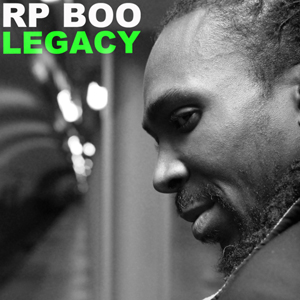RP Boo Legacy
RP Boo (a.k.a. Kavain Space) is often credited for helping to create the footwork genre […]

RP Boo (a.k.a. Kavain Space) is often credited for helping to create the footwork genre with his 1997 tune “Baby Come On.” Legacy is actually RP Boo’s first-ever full-length release, but his prowess as a producer is readily apparent here. Simply put, the tunes on Legacy don’t move quite like anything else within this sound, and the LP quickly displays just how inadequate many producers—particularly those outside of the Windy City—are when adopting juke and footwork as their own.
There’s no gentle entry, as a barrage of rolling toms, rimshots, and snares introduces album opener “Steamidity,” a thick bassy mess of sticky percussion and chopped strings. The song’s seemingly epileptic level of impaired movement is tense, dramatic, and utterly dangerous. As the album proceeds, it becomes difficult to shake the notion that growing up in Chicago’s juke/footwork culture is essential to properly creating the creepy, gritty atmosphere that defines the sound.
Somewhat surprisingly, though, RP Boo’s record isn’t entirely a footwork album. Tracks like “Red Hot” work inside the realm of the genre’s forefather, ghetto house, and some of the most exciting moments on Legacy occur when RP Boo clearly connects one with the other. Morphing bangs and chants set the stage for “There U’Go Boi” before micro-programmed drum fills suddenly shift gears from a linear pulse to the off-kilter skitter of an entirely different snare pattern. With string samples reminiscent of Star Wars, “Robotbutizm” has a nauseous and gaudy lurch, which eventually takes on a frightening pace with the wet smack of electro. “Speakers R-4 (Sounds),” meanwhile, is a marvel, and RP Boo’s masterful use of reverb makes the tune sound like being in the room of a frenzied warehouse party. At points like this, claims of Space being a footwork originator are understandable; he gleefully casts flurries of dark drum energy down winding tunnels of crushing sub bass, transmitting disembodied utterances and fractured rhythms with a veteran’s finesse.
Few truly distinctive examples of footwork have found their into the world lately, but RP Boo’s LP goes a long way towards revealing the potential diversity and immensity of the genre. Where other juke/footwork efforts can seem inaccessible, or at least difficult for outsiders to approach, RP Boo employs bits of vintage soul samples, mainstream hip-hop, film soundtracks, oddball clips of dialog, and all sorts of other sampled material throughout Legacy. More importantly, he layers them in ways that sound especially peculiar and alien, even if they’re merely the result of Space’s instinctive tapping on an MPC. The effect is disconcerting and frenetic—even in the context of the primed madness of footwork—and certainly won’t come across as easy listening for most. Regardless, Legacy still feels like the work of a true original.

